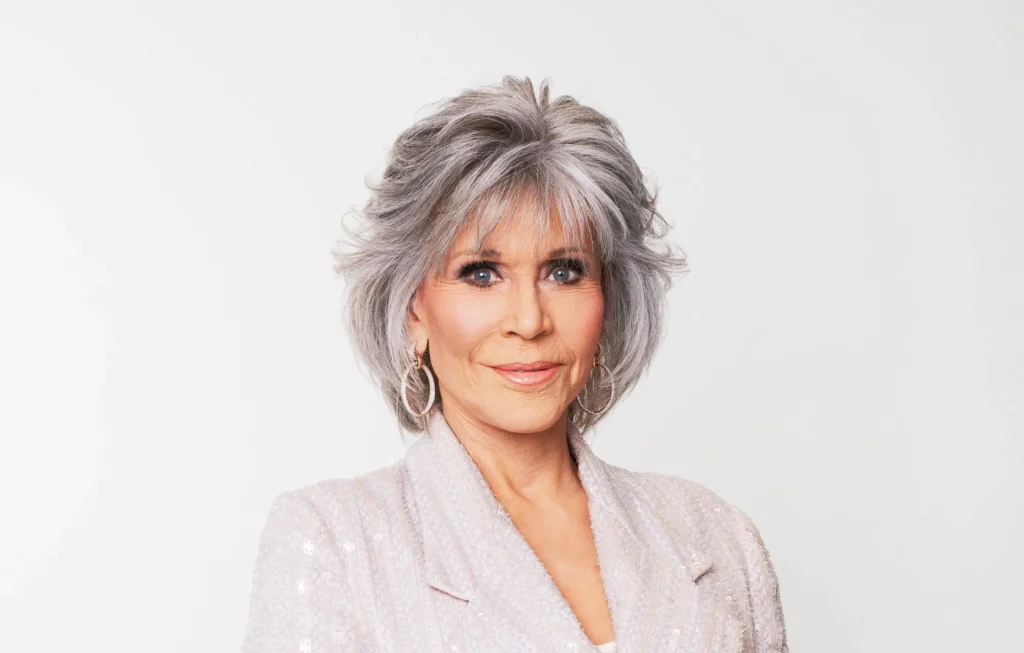Understanding Jane Fonda’s Perspective on Faith

Understanding Jane Fonda's Perspective on Faith
Introduction to Jane Fonda’s Faith Journey
Jane Fonda, an iconic figure in American cinema, is not only known for her illustrious acting career but also for her profound exploration of faith throughout her life. Her spiritual journey has evolved over the decades, influenced by a myriad of personal experiences, struggles, and triumphs. Born to a well-known acting family, Fonda’s early life was marked by both privilege and the challenges of growing up under public scrutiny. This backdrop laid the foundation for her later examinations of spirituality and belief.
Throughout her career, Fonda has faced significant life events that have shaped her perspective on faith. Her tumultuous relationship with her father, Henry Fonda, and her struggles with body image and self-acceptance have prompted deep reflection about life’s meaning beyond the superficial. Additionally, her activism during the Vietnam War and her consequent public backlash led Fonda to seek solace and understanding beyond societal norms, eventually guiding her toward contemplation of higher powers and personal connections with faith.
As Fonda navigated the complexities of fame, she encountered moments of crisis that further transformed her beliefs. Her commitment to social justice and advocacy for marginalized communities underscores her belief in a universe intertwined with compassion and responsibility. Through engaging with different spiritual teachings, including Buddhism and Christianity, Fonda illustrates a journey of exploration marked by a desire for connection, understanding, and service to others.
Overall, Jane Fonda’s faith journey encapsulates a deep search for meaning amid life’s uncertainties. It serves as an invitation for others to reflect on their own beliefs and the factors that shape them. By delving into Fonda’s experiences, we can understand the nuances of faith and its impact on one’s life choices and worldview.
Defining Faith: Jane’s Personal Insights
Jane Fonda’s perspective on faith centers around a deeply personal and transformative understanding that extends far beyond mere religious beliefs. For her, faith manifests as a profound connection to the universe and an innate trust in the process of life. It encapsulates not just spiritual or religious dimensions but also incorporates elements of hope, resilience, and compassion. Fonda articulates that faith, in her definition, is a guiding force that informs her choices and interactions with others.
In various interviews, Fonda has expressed that her faith serves as an anchor during tumultuous times. It is through faith that she finds the inner strength to confront challenges, whether in her personal life or in her advocacy for social justice and environmental issues. This belief in something greater than oneself fosters a sense of responsibility to contribute positively to the world, an ethos that Fonda has embodied throughout her career.
Furthermore, Fonda emphasizes the importance of faith in fostering community and connection. She reflects on the role of belief systems in bringing people together, regardless of their specific religious affiliations. Through her lens, faith becomes a tool for uniting diverse individuals towards shared goals and dreams. The empathy and support that arise from mutual faith strengthen relationships and build bridges across various divides.
Ultimately, Jane Fonda’s insights on faith reveal a holistic view that encompasses personal growth, social responsibility, and community solidarity. Her understanding of faith positions it as a dynamic and integral part of human experience, enabling individuals to navigate life’s complexities with confidence and courage. This meaningful interpretation of faith resonates as a call to embrace both personal and collective journeys with open hearts and minds.
Inspirational Figures in Jane’s Faith Life
Throughout her life, Jane Fonda has been deeply impacted by various individuals who have shaped her understanding of faith and spirituality. Among these figures are mentors, religious leaders, and acquaintances who have guided her in pivotal moments. Their influences have been instrumental in fostering her belief systems and encouraging her to explore the complexities of her own faith journey.
One significant figure in Fonda’s life was her father, Henry Fonda, who introduced her to family values and instilled a moral compass that would guide her. His strong work ethic and dedication to his craft served as an early example of the importance of integrity, a concept that Fonda often associates with spiritual growth. The lessons she learned from her father have resonated throughout her life and continue to shape her perspectives on faith and responsibility.
In addition to her family, Fonda has frequently spoken about the profound impact of various spiritual leaders and mentors she encountered throughout her career. One such figure is the late Reverend Dr. Martin Luther King Jr., whose commitment to social justice and faith-based activism inspired Fonda’s own efforts in humanitarian causes. His teachings about the intersection of faith and social responsibility have reinforced her belief that spiritual growth can manifest through action and advocacy.
Furthermore, Fonda’s friendships with fellow artists and activists have also contributed to her spiritual development. Engaging in discussions with like-minded individuals has allowed her to reflect on her beliefs and challenge her assumptions. These relationships have provided a mutual support system and fostered a sense of community that Fonda holds dear as she navigates her faith journey. Through these influences, Fonda continues to evolve spiritually and embrace the complexities of faith in the modern world.
Challenges and Doubts: Navigating Faith
Jane Fonda’s journey of faith has not been devoid of challenges and doubts, which she has openly acknowledged throughout her life. Growing up in a prominent family, with an influential father, she often faced the immense expectations that accompanied her upbringing. This environment led her to question the very foundation of her beliefs, as she grappled with both societal and personal pressures to conform to certain ideologies regarding faith. Such an upbringing may provide an initial sense of direction, yet it frequently breeds uncertainty, compelling individuals to delve deeper into their own beliefs.
As she transitioned into adulthood, Fonda’s career in the film industry introduced her to a diverse array of perspectives. Encountering varied worldviews further amplified her doubts and intensified her introspection about faith. The challenges she faced, including personal crises and public scrutiny, made her question her spiritual stance. These experiences acted as catalysts, prompting her to explore different dimensions of faith, spirituality, and morality. For Fonda, wrestling with these uncertainties became a pathway to understanding the complexities of her faith, rather than a barrier to it.
Moreover, Fonda’s dedication to social justice and activism added another layer to her reflection on faith. She often found herself reconciling her belief in a higher purpose with the harsh realities of the world. This conflict created a space for her to seek out personal resolutions, ultimately shaping her understanding of faith as a catalyst for social change. Through her journey, Fonda learned that faith is not merely a set of doctrines to be followed but a dynamic process of seeking and understanding. Her ongoing exploration highlights that grappling with doubts and navigating challenges is an intrinsic part of the faith journey, leading to a richer and more profound spiritual understanding.
The Role of Community in Jane’s Faith
Jane Fonda’s understanding of faith is notably intertwined with the concept of community. Throughout her life, she has expressed how being part of a collective has profoundly shaped her beliefs and spiritual journey. Community, in its various forms, offers individuals a sense of belonging, mutual support, and an environment in which faith can flourish. For Fonda, this communal aspect has been essential, as it not only provided her with emotional sustenance but also allowed her beliefs to deepen and evolve.
Fonda has often highlighted the significance of shared experiences in faith. Participating in group discussions, spiritual gatherings, and communal rituals has reinforced her convictions and instilled a sense of purpose. The interactions within a supportive community can serve as a catalyst for personal growth, enabling individuals to reflect on their values and beliefs in a safe environment. For her, belonging to a community meant surrounding herself with like-minded individuals who encouraged exploration and dialogue around faith. This environment has often been characterized by openness and acceptance, allowing for diverse interpretations and expressions of spirituality.
Moreover, the importance of community extends beyond mere companionship; it acts as a framework for accountability and encouragement in one’s spiritual journey. Fonda recognizes the power of collective prayer and intention, where individuals come together to amplify their hopes and aspirations. Such practices can strengthen personal faith while fostering a profound connection to something greater than oneself. Through her experiences, it becomes evident that Jane Fonda’s faith is not solely an individual endeavor; rather, it is enriched by the presence of a compassionate community that nurtures and supports one’s spiritual growth.
Faith and Activism: A Connection
Jane Fonda, a prominent figure in both the arts and social activism, often discusses the intricate relationship between her faith and her lifelong dedication to activism. Her spiritual beliefs serve not only as a guiding light in her personal life but also fuel her passion for social justice. Fonda asserts that her faith imbues her actions with a sense of moral responsibility, compelling her to speak out against injustices and advocate for those who are marginalized.
The intersection of faith and activism, as articulated by Fonda, embodies the principle that individuals have a moral imperative to engage in the world around them. She emphasizes that one’s spiritual convictions can motivate a commitment to social causes, reinforcing the idea that personal responsibility extends beyond individual well-being to encompass the welfare of the broader community. This perspective resonates deeply with many activists who view their work as an expression of their values and beliefs.
Moreover, Fonda connects her activism to the teachings of compassion and empathy found within her faith. She advocates for a deeper understanding of the struggles faced by marginalized groups, asserting that an empathetic stance is essential for social justice. Fonda’s belief in interconnectedness reflects a theological understanding that every individual deserves dignity and respect, regardless of their circumstances. In moments of social unrest, her faith reminds her of the vital need for solidarity and support among individuals fighting for equality and justice.
Overall, Jane Fonda’s insights illustrate how faith can serve as both a personal compass and a catalyst for activism. Her conviction that one’s spiritual beliefs can shape and intensify the pursuit of social justice invites a reflective examination of how faith can mobilize individuals to take meaningful action toward a more equitable society.
Reflections on Life’s Transitions and Faith
Throughout her life, Jane Fonda has experienced numerous transitions that have profoundly influenced her perspective on faith. These pivotal moments have not only shaped her understanding of spirituality but also provided her with opportunities for deep self-reflection and growth. Fonda’s journey illustrates how life changes—ranging from personal losses to pivotal moments in her career—can lead to significant spiritual awakenings.
One notable transition in Fonda’s life was her divorce from film director Roger Vadim in the late 1970s. This event, marked by intense emotional turmoil, propelled her to explore her beliefs more deeply. Fonda found herself questioning the nature of love, companionship, and the role of faith in guiding personal relationships. During this time, she engaged with various spiritual practices that allowed her to confront her fears and insecurities, ultimately leading her to redefine her conception of faith as a source of inner strength.
Another significant shift occurred during her involvement with activism and social justice movements. Fonda’s work in these arenas forced her to grapple with moral and ethical questions that pushed her beyond traditional religious boundaries. She began to see faith not just as an individual experience but as a collective force capable of inspiring change within society. Her commitment to environmental issues and women’s rights further solidified her belief in the interconnectedness of humanity, encouraging her to adopt a more inclusive perspective on spirituality.
Fonda’s reflection on these life transitions reveals that faith is not a static entity but rather a dynamic journey that evolves through life’s experiences. Each change has prompted her to reassess and deepen her understanding of what it means to have faith—ultimately highlighting that spiritual growth often emerges from life’s most challenging moments.
Practices and Rituals: Keeping Faith Alive
Jane Fonda’s journey of faith is a reflection of her commitment to spiritual growth, which she nurtures through a variety of practices and rituals. Central to her routine is the practice of meditation, a discipline that fosters a deep connection to her inner self and the world around her. By dedicating time each morning to quiet contemplation, Fonda cultivates a mindful state that allows her to tackle the challenges of the day with tranquility and clarity. This ritual serves not only as a means of grounding herself but also as a way to align her actions with her core beliefs.
In addition to meditation, Fonda places significant emphasis on gratitude. Acknowledging the blessings in her life is a daily ritual that she holds dear. Whether it is through journaling or silent reflection, expressing gratitude acts as a reaffirmation of her faith. This practice enables her to maintain a positive outlook, encouraging resilience in the face of adversity. Fonda’s commitment to gratitude underscores her understanding of faith as an active engagement in recognizing the inherent goodness in her life and the people around her.
Community involvement is yet another pillar of Fonda’s spiritual routine. She regularly participates in group activities that promote social justice and environmental awareness, reflecting her belief that faith should extend beyond personal introspection and into communal action. By engaging in these collective efforts, she reinforces her spiritual convictions and fosters a sense of belonging with like-minded individuals. Together, these practices encapsulate Fonda’s holistic approach to faith—one that is both deeply personal and outwardly impactful. Through these rituals, she continuously revitalizes her connection to her spiritual beliefs, exemplifying how faith can act as a guiding force in life’s journey.
Conclusion: The Evolving Nature of Faith
Faith, a deeply personal aspect of human existence, often transforms as individuals navigate the complexities of life. Jane Fonda, an illustrious figure in both cinema and activism, provides unique insights into the evolution of faith throughout her journey. Her reflection on faith emphasizes how one’s spiritual beliefs are not static; rather, they can adapt and grow over time in response to personal experiences, societal changes, and deeper understandings.
Fonda articulates that her comprehension of faith has progressed significantly since her earlier years. Initially, she may have viewed faith through a more conventional lens, often shaped by societal expectations. However, as she embraced new ideas and encounters, her perspective shifted. This transformation embodies the essence of faith as an evolving entity that encourages individuals to question, learn, and ultimately redefine their spiritual beliefs. Such a journey underscores the importance of remaining open to various viewpoints that may challenge preconceived notions.
Moreover, Fonda’s narrative resonates with the collective human experience. Many undergo periods of doubt or reconsideration as they seek deeper connections within themselves and the universe. The ability to adapt one’s faith in light of new evidence or experiences points to a healthy intellectual and spiritual curiosity. By acknowledging the changing nature of faith, individuals can cultivate resilience and foster a more profound understanding of themselves and their relationships with others.
In embracing the evolving nature of faith, we recognize that our spiritual paths are not linear but rather dynamic, filled with trials that invite growth. Jane Fonda’s perspective encourages a transformative approach to faith that values openness, inclusivity, and a willingness to learn. Such insights promote a richer, more authentic spiritual journey for everyone.













Leave a Reply
You must be logged in to post a comment.